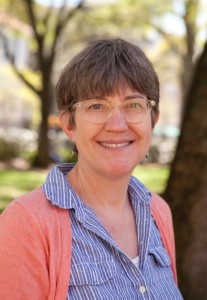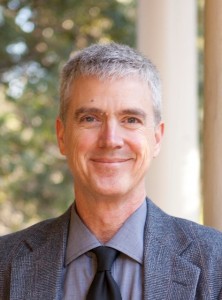Responding to the Emanuel AME Tragedy
 As writers, readers, and thinkers dedicated to the written and spoken word, we are familiar with the challenge of how to respond to unconscionable acts of violence and hatred. The authors we read and teach model the importance and power of such responses. In the wake of the Emanuel AME murders this past summer, a number of English faculty offered their own responses, both personal and political.
As writers, readers, and thinkers dedicated to the written and spoken word, we are familiar with the challenge of how to respond to unconscionable acts of violence and hatred. The authors we read and teach model the importance and power of such responses. In the wake of the Emanuel AME murders this past summer, a number of English faculty offered their own responses, both personal and political.
Dr. Conseula Francis, professor of English and founding director of the African American Studies program at CofC, emerged as a powerful spokesperson on this issue, her comments appearing in a number of local newspapers: “This was not an unimaginable act committed by a lone mentally ill man,” she notes in one such article highlighting divergent views on the tragedy. “This was the predictable result of long-standing systemic racism that paints black people as usurping, free-loading, violent thugs.” This gets to the heart of what it means to understand and reflect upon the often unspoken and unrecognized privilege that one’s skin color confers. “White people may be able to sustain the fiction that these are isolated incidents,” she continues, “but black people cannot. Our lives depend on recognizing the truth.” And if we value the lives of those we live among, we all need to recognize that truth. It starts with words, with conversation: “So much of African-American history and culture has roots here, and those roots reach out across the country and around the globe,” Francis comments in another article on how we, as a community, can move forward. “Talking seriously and openly about race and justice here in Charleston can go a long way in facilitating these conversations elsewhere.”
Another English professor, Dr. Simon Lewis, has played a strong role organizationally as well, compiling our campus’s own “Charleston Syllabus,” which highlights a collection of events at the College and throughout the Lowcountry this past fall, emphasizing events that focused on issues of race relations and civil rights. This “syllabus” is modeled on the work begun by Chad Williams from Brandeis University, who initiated a #charlestonsyllabus that provides an evolving list of readings–political and historical, literary and cultural–that help contextualize the Emanuel AME tragedy and that are intended to inform ongoing conversations about that tragedy.
Just as Francis and Lewis have been powerful spokespersons in their own way, a number of English faculty members–both in reflective blog posts and pieces for national magazine such as Vanity Fair–have contributed their voices as well as they reflect on history, race, and place. Below, you can read brief excerpts from other faculty responses to the Emanuel AME tragedy and a link to where you can read more.
Bret Lott: “This is My City on the News,” Vanity Fair
 [quote]”The usual suspects: CNN, FOX, ABC, NBC, CBS, ad infinitum, ad nauseam. The talk centrifuged into the enriched uranium that is gun control, domestic terrorism, hate crimes, Christian persecution, and, of course, Obama and Hillary and the posse of Republican candidates. And so my question, the answer to which I already know: Do any of them think we don’t need to hear them, because we understand intrinsically this tragedy, and the peace we need to begin to heal will only begin if they get out of the way? That the sports guy in the polo bears more gravitas than any network reporter could ever offer up? Do any of them know the best place to have a wedding veil dry cleaned, or the relative price of gas? Do any of them know how sometimes the doors stood open at the Emanuel A.M.E. Church, and you could hear the organist playing inside, and that this was a good thing to listen to?”[/quote]
[quote]”The usual suspects: CNN, FOX, ABC, NBC, CBS, ad infinitum, ad nauseam. The talk centrifuged into the enriched uranium that is gun control, domestic terrorism, hate crimes, Christian persecution, and, of course, Obama and Hillary and the posse of Republican candidates. And so my question, the answer to which I already know: Do any of them think we don’t need to hear them, because we understand intrinsically this tragedy, and the peace we need to begin to heal will only begin if they get out of the way? That the sports guy in the polo bears more gravitas than any network reporter could ever offer up? Do any of them know the best place to have a wedding veil dry cleaned, or the relative price of gas? Do any of them know how sometimes the doors stood open at the Emanuel A.M.E. Church, and you could hear the organist playing inside, and that this was a good thing to listen to?”[/quote]
Dr. Julia Eichelberger: “Witnessing” “I Was a Stranger and you Welcomed Me,” and “In the Moment: Grief and Change,” The Glebe Street Hacks
 [quote]”The Confederate flag came down from the South Carolina statehouse grounds this month, later than it should’ve and sooner than I’d have predicted, and most people are glad about that, but some are concerned that this trend could be harmful, that other monuments might be taken down, streets renamed, and that this could “erase history.” It seems, to some op-ed columnists at least, that re-interpreting the significance of our shared history is, actually, a forgetting, a suppression of history. It’s as if the word doesn’t mean “what happened in the past” or “our incomplete but ongoing attempt to understand what happened in the past.” Rather, “history” means “a story about the past that I wish to continue telling,” or maybe “things I’ve come to believe about the past.” When the President spoke at Clementa Pinckney’s funeral last month, many were quick to call it historic, and I’m inclined to agree with them. My own experience of listening to the speech, however, is a different kind of history. This account has limited historic significance. It’s just a story I want to tell myself, an attempt to understand what I’ve come to believe, about the present and the future.”[/quote]
[quote]”The Confederate flag came down from the South Carolina statehouse grounds this month, later than it should’ve and sooner than I’d have predicted, and most people are glad about that, but some are concerned that this trend could be harmful, that other monuments might be taken down, streets renamed, and that this could “erase history.” It seems, to some op-ed columnists at least, that re-interpreting the significance of our shared history is, actually, a forgetting, a suppression of history. It’s as if the word doesn’t mean “what happened in the past” or “our incomplete but ongoing attempt to understand what happened in the past.” Rather, “history” means “a story about the past that I wish to continue telling,” or maybe “things I’ve come to believe about the past.” When the President spoke at Clementa Pinckney’s funeral last month, many were quick to call it historic, and I’m inclined to agree with them. My own experience of listening to the speech, however, is a different kind of history. This account has limited historic significance. It’s just a story I want to tell myself, an attempt to understand what I’ve come to believe, about the present and the future.”[/quote]
Dr. Joseph Kelly: “Disrespecting White Supremacists,” The Glebe Street Hacks
 [quote]”Last week, a white supremacist gunned down nine black men and women in Emanuel AME Church in Charleston. The AME Church has suffered mass murder before. In 1822, it was at the vortex of a supposed slave insurrection led by Denmark Vesey. Historians are split on whether or not Vesey really plotted rebellion. He went to the scaffold insisting that he didn’t, and I believe him. That crisis turned American history. Slavery had been unraveling in Charleston. The acid logic of Jefferson’s credo—that all men were created equal–was slowly melting chains. The city even allowed two unsupervised, all-black AME congregations to organize in 1818. (Vesey’s congregation met in Cow’s Alley in the Hampstead neighborhood of the Eastside.) With visions of Tara in our minds, it might be hard to believe that in the early 1800s no respected public man anywhere in the United States, not even here in Charleston, would avow that slavery was good. Everyone considered it evil and expected its eventual dissolution. But in 1822, Charleston’s mayor, James Hamilton, Jr., who hated these reforms, caught wind of a rumor. His thugs rounded up suspected blacks. Jailors tortured their prisoners. Hamilton threatened them with execution. Gradually, to save themselves, a few began to weave the tale of insurrection Hamilton wanted to hear, a massacre of white men, the mass rape of white women, the torching of the city, all supposedly led by a free man of color, a lay preacher in the AME church, Denmark Vesey. It was an incredible story: neither the governor nor a U. S. Supreme Court Justice living in Charleston believed it. But massive fear is a hard thing to resist, and Hamilton had his way. A hundred thirty-one blacks and a few whites faced his extra-legal star chamber. Hamilton hanged thirty-five them, some free, most slaves, all innocent. State-sponsored terrorism.”[/quote]
[quote]”Last week, a white supremacist gunned down nine black men and women in Emanuel AME Church in Charleston. The AME Church has suffered mass murder before. In 1822, it was at the vortex of a supposed slave insurrection led by Denmark Vesey. Historians are split on whether or not Vesey really plotted rebellion. He went to the scaffold insisting that he didn’t, and I believe him. That crisis turned American history. Slavery had been unraveling in Charleston. The acid logic of Jefferson’s credo—that all men were created equal–was slowly melting chains. The city even allowed two unsupervised, all-black AME congregations to organize in 1818. (Vesey’s congregation met in Cow’s Alley in the Hampstead neighborhood of the Eastside.) With visions of Tara in our minds, it might be hard to believe that in the early 1800s no respected public man anywhere in the United States, not even here in Charleston, would avow that slavery was good. Everyone considered it evil and expected its eventual dissolution. But in 1822, Charleston’s mayor, James Hamilton, Jr., who hated these reforms, caught wind of a rumor. His thugs rounded up suspected blacks. Jailors tortured their prisoners. Hamilton threatened them with execution. Gradually, to save themselves, a few began to weave the tale of insurrection Hamilton wanted to hear, a massacre of white men, the mass rape of white women, the torching of the city, all supposedly led by a free man of color, a lay preacher in the AME church, Denmark Vesey. It was an incredible story: neither the governor nor a U. S. Supreme Court Justice living in Charleston believed it. But massive fear is a hard thing to resist, and Hamilton had his way. A hundred thirty-one blacks and a few whites faced his extra-legal star chamber. Hamilton hanged thirty-five them, some free, most slaves, all innocent. State-sponsored terrorism.”[/quote]







